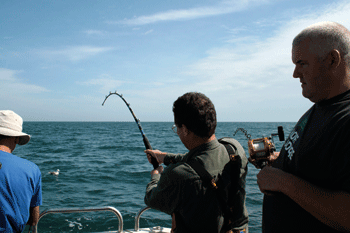Fishing contest

I have fished for most things since childhood, but have never bothered to enter a fishing competition. I?m not sure why, but for some reason they have never appealed to me. However, one contest that does stir a competitive streak is the annual three-day Weymouth Conger Festival, held in August. It is a great adventure in good company and it always attracts anglers from all areas of the British Isles.
There is something about a conger that evokes fear. Most fishermen seem to have some epic tale involving battles with congers. I met one chap who hooked one off the beach and was so scared that it would attack him that he cut the line. The conger is a handful. It is pure muscle ? a powerful and dogged fighter in the water, and a tough customer on land. Unlike other fish, there is not much to grab hold of where a conger is concerned, and combined with its strength, slime, and the ability to reverse and spin at high speed in the water, it takes experience to deal with them. Congers can be found throughout the British Isles, but some of the largest inhabit the deep reefs and wrecks of the Channel. The current British record is 133lb 4oz.
The way the competition works is as follows. The charter fleet leaves at 7am, must be back by 6pm and each skipper heads out for what they believe is the best wreck or reef. Some target big solitary eels, while others go for smaller ones but in greater numbers. Barbless hooks are used and all the smaller eels are returned, unless they are potential winners. If, for example, a 60lb eel is caught, the skipper will radio the other boats, so they do not keep any smaller fi sh. There are prizes for the biggest eel and for the most points scored. This is done on the basis of honesty, where the skipper estimates the weight, the eel is released and it is logged next to the angler?s name.
I was fishing aboard Pat Carlin?s Meridian Express, with his crewman and ace fisher Richard ?Bling? ? so named for his trademark thick gold chains. The first day, I managed two eels around the 30lb mark and a nice ling, which found its way into my freezer.
On the second day, however, I was busier. I managed five eels in quick succession ? I was off to a flying start and I thought that victory might be within my grasp. Sadly, I peaked too soon and the run of eels dried up. I ended the day with eight ? several on the boat were into double figures with Carol Denning catching nine. When several anglers hook at the same time it can be amusing to watch as the lines get crossed and they have to duck under one another in an attempt to avoid the cat?s cradle of lines that can result. Having said that, there were very few bad tangles over the three days.
The final day was choppy, but the eels were obliging. Normally, the skipper will anchor so that the wreck is several yards behind the boat. This forces the eels to come out into the open for the bait and they have less chance of returning to the wreck and snapping the line. However, the really big eels are reluctant to leave their rusty haven, so the skipper may let out a bit of anchor rope and ease the boat back until it is above the wreck.
Last chance for a big catch
With about 20 minutes to go and bait running out, crewman Richard passed me a black bream flapper bait that must have weighed at least 2lb.
Pat had backed the boat up so that it was almost directly above the wreck to give us a last chance for a big ?un. I lowered the seemingly too-big bait to the bottom and, within moments, a conger was on it. I leaned into the eel and started winding.
It felt powerful, heavy and confident ? the sign of a big fish ? and then it went solid and could not be budged. As Pat once told me, ?a conger will always go where its tail wants to go?. Never a truer word was spoken.
The eel had managed to get its tail into the wreck and simply retreated into its hole. It could not be dislodged and it won the battle. Perhaps this was my own fault for not heaving it away from the wreck immediately ? something that is easier said than done.
Whether or not it was a monster, I will never know, but either way, it is a classic ?one that got away? fishing story with which I can bore people with for many years to come. It had been a great three days? fishing. Hats off to the skippers and event organisers ? it is easy to enter any competition, but just as easy to forget that someone has to do the donkey work of administrating it. Roll on next year.








